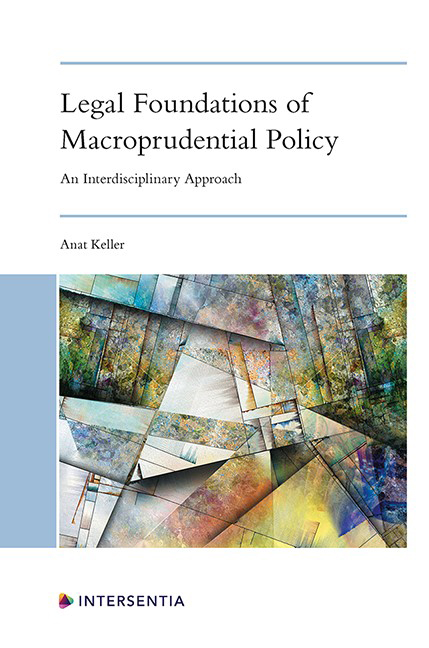Book contents
- Frontmatter
- Dedication
- Contents
- List of Cases
- List of Instruments
- Chapter 1 Introduction and Background
- Chapter 2 A Macroprudential Mandate: How to Operationalise it
- Chapter 3 Institutional and Procedural Design for Macroprudential Regimes: Institutional Models and the Nature of the Decision-Making Process
- Chapter 4 Powers of Macroprudential Authorities and the Use of Soft Law
- Chapter 5 Formulating a Taxonomy of Supervisory Approaches in Macroprudential Policymaking
- Chapter 6 Activating and Calibrating Macroprudential Instruments
- Chapter 7 Independence, Accountability and Transparency of Macroprudential Policy
- Chapter 8 A Non-Dichotomous View of Macroprudential Policy and Other Policy Areas
- Chapter 9 Data Collection and Analysis in Macroprudential Policy: An Epistemic View
- Chapter 10 Th e Global Architecture of Systemic Risk Regulation and Supervision
- Index
- About the Author
Chapter 1 - Introduction and Background
Published online by Cambridge University Press: 03 October 2020
- Frontmatter
- Dedication
- Contents
- List of Cases
- List of Instruments
- Chapter 1 Introduction and Background
- Chapter 2 A Macroprudential Mandate: How to Operationalise it
- Chapter 3 Institutional and Procedural Design for Macroprudential Regimes: Institutional Models and the Nature of the Decision-Making Process
- Chapter 4 Powers of Macroprudential Authorities and the Use of Soft Law
- Chapter 5 Formulating a Taxonomy of Supervisory Approaches in Macroprudential Policymaking
- Chapter 6 Activating and Calibrating Macroprudential Instruments
- Chapter 7 Independence, Accountability and Transparency of Macroprudential Policy
- Chapter 8 A Non-Dichotomous View of Macroprudential Policy and Other Policy Areas
- Chapter 9 Data Collection and Analysis in Macroprudential Policy: An Epistemic View
- Chapter 10 Th e Global Architecture of Systemic Risk Regulation and Supervision
- Index
- About the Author
Summary
In 2009, Claudio Borio observed that “ We are all macroprudentialists now “ . The observation reflected the emergence of the term macroprudential policy as a true buzzword and its dominance in the post-crisis public discourse. As the world was experiencing the long-lasting aftershock of the 2007 – 2009 financial crisis, macroprudential policy became to be the missing link that could rectify the failure to identify, in time, and prevent or mitigate systemic risks. This acknowledgement signified a major shift in the regulatory and supervisory thinking. While micro-prudential regulation and supervision was still considered a necessary policy to maintaining the stability of the financial system, it was no longer viewed as a sufficient one. The reports that mushroomed following the financial crisis emphasised the importance of adding a macroprudential overlay to the existing concoctions of prudential and macroeconomic policy areas. These reports were quickly followed by the design of national and regional macroprudential authorities, either by establishing new institutions for that purpose or providing new powers to existing institutions. In the UK, the Financial Policy Committee (FPC), a committee of the Bank of England, was established in 2013. It is responsible for identifying, monitoring and taking action to remove or reduce systemic risks with a view to protecting and enhancing the resilience of the UK financial system and exercises its functions with a view to contributing to the achievement of the Bank ‘ s financial stability objective. In the US, the Financial Stability Oversight Council (FSOC) is a collaborative body chaired by the Secretary of the Treasury that was established in 2010 under the Dodd-Frank Wall Street Reform and Consumer Protection Act, with a macroprudential mandate to identify risks and respond to emerging threats to the financial stability of the US. In the EU, the European Systemic Risk Board (ESRB) became operational in 2011 as part of the new European System of Financial Supervision (ESFS) and is responsible for the macroprudential oversight of the EU financial system and the prevention and mitigation of systemic risk.
The book offers a critical, contextual and comparative examination of the nature of macroprudential policy and exposes its conflictual elements and the unique challenges that macroprudential authorities must face. The book explores why macroprudential policy is needed and how to design tailored legal, institutional and governance frameworks that support the various supervisory stages in macroprudential regimes.
- Type
- Chapter
- Information
- Legal Foundations of Macroprudential PolicyAn Interdisciplinary Approach, pp. 1 - 20Publisher: IntersentiaPrint publication year: 2020



